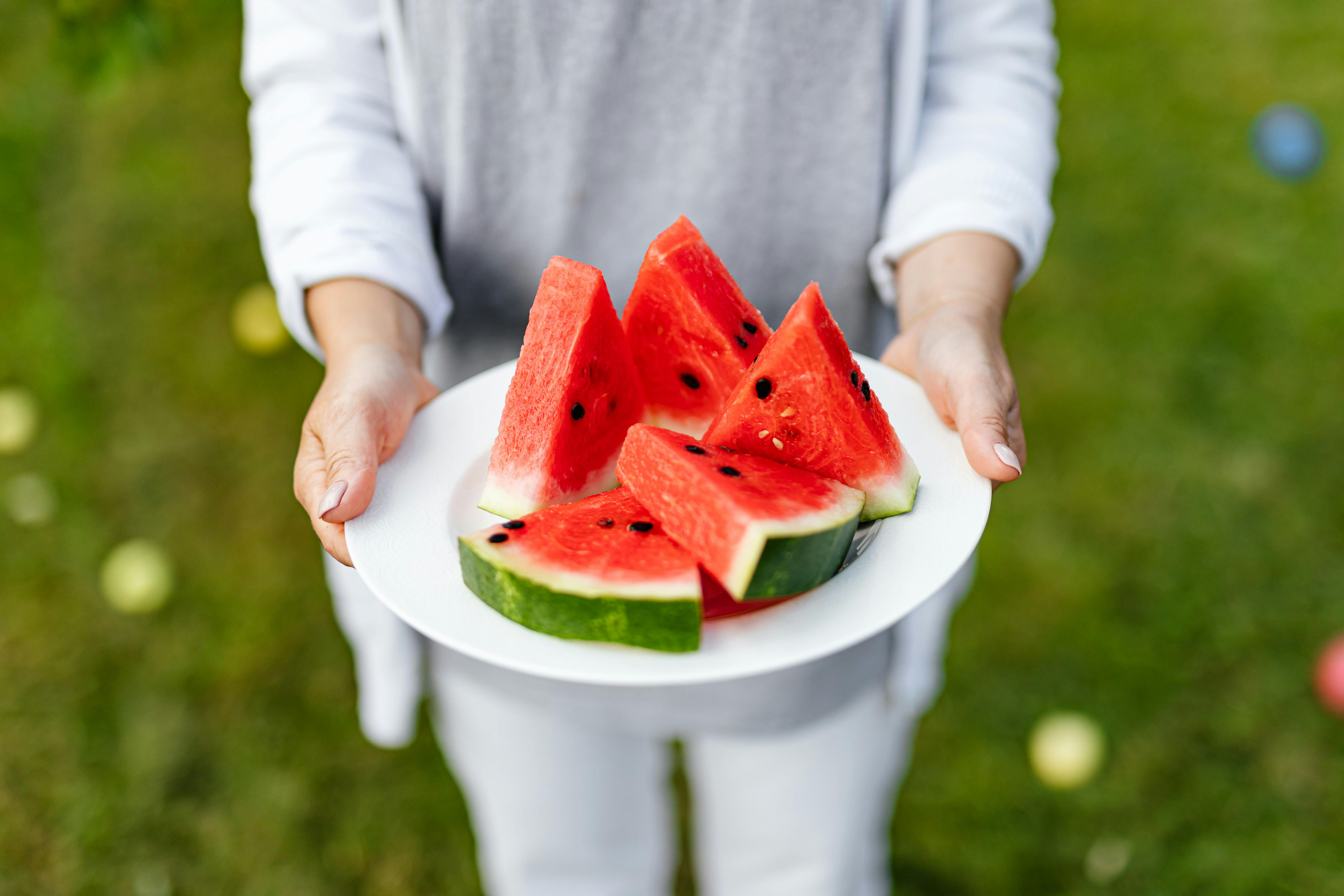Is it good to eat watermelon at night?
Yes!
Not only is watermelon a tasty and refreshing fruit, but it also offers several health benefits when consumed in the evening.
Watermelon is often recommended as a healthy nighttime snack due to its hydrating properties, essential nutrients, and sleep-supporting compounds.
Backed by scientific research, including a study from the National Institutes of Health (NIH) on the benefits of lycopene and hydration, watermelon proves to be more than just a summertime treat.
Many of my clients have reported better digestion and improved sleep after incorporating it into their evening routine.
In this article, we’ll explore six evidence-based benefits of eating watermelon at night, along with practical tips on portion control to avoid excessive late-night bathroom trips.
Key Nutrients in Watermelon (Per 100g Serving)
Here’s a breakdown of the essential nutrients found in watermelon.
Calories: 30 kcal (low-calorie, perfect for weight management)
Water content: 92% (excellent for hydration)
Carbohydrates: 7.6g (mostly natural sugars like fructose)
Fiber: 0.4g (aids digestion)
Protein: 0.6g (minimal, but contributes to satiety)
Fat: 0.2g (virtually fat-free).
Watermelon is packed with essential micronutrients, including:
✔ Vitamin C (8.1mg, 9% DV) – Boosts immunity and skin health.
✔ Vitamin A (569 IU, 11% DV) – Supports vision and immune function.
✔ Potassium (112mg, 2% DV) – Helps regulate blood pressure and muscle function.
✔ Magnesium (10mg, 2% DV) – Promotes relaxation and better sleep.
✔ Lycopene (4.5mg) – A powerful antioxidant linked to heart health.
Why These Nutrients Matter at Night
Hydration (High Water Content) – Prevents dehydration, which can disrupt sleep.
Natural Sugars – Provides a mild energy boost without spiking blood sugar excessively.
Magnesium & Potassium – Helps relax muscles and nerves for deeper sleep.
Lycopene & Vitamin C – Supports overnight cell repair and immunity.
Is Watermelon Too Sugary Before Bed?
While watermelon does contain natural sugars (about 6g per 100g), its low glycemic load (GL: 2) means it won’t cause a major blood sugar spike.
However, if you have diabetes or insulin resistance, moderation is key—stick to 1-2 cups per serving.

6 Science-Backed Benefits of Eating Watermelon at Night
Now that we understand watermelon’s impressive nutritional profile, let’s explore the specific benefits it offers when consumed in the evening.
1. Enhances Sleep Quality Naturally
Watermelon contains two key sleep-supporting nutrients:
Magnesium – Relaxes muscles and calms the nervous system
Potassium – Helps prevent nighttime muscle cramps
A 2021 study in the Journal of Sleep Research found that magnesium-rich foods improved sleep efficiency by 15% in participants with mild insomnia.
The natural sugars in watermelon may also help tryptophan cross the blood-brain barrier more effectively, potentially supporting melatonin production.
Tip: Pair watermelon with a handful of walnuts (rich in melatonin) for an extra sleep boost.
2. Keeps You Hydrated Through the Night
With 92% water content, watermelon helps prevent nighttime dehydration that can disrupt sleep.
The electrolytes (potassium and magnesium) maintain proper fluid balance, so you wake up feeling refreshed instead of thirsty.
Many people notice fewer midnight bathroom trips when they snack on watermelon instead of drinking water before bed.
3. Supports Healthy Digestion
The water and fiber in watermelon gently aid digestion without causing bloating.
It helps food move smoothly through your system and acts as a mild natural diuretic to reduce water retention.
For sensitive stomachs, stick to about 1 cup to avoid potential discomfort.
4. Boosts Overnight Antioxidant Protection
Watermelon is packed with lycopene – an antioxidant that continues working while you sleep.
Studies show lycopene peaks in your bloodstream 6-8 hours after eating, making evening the perfect time to consume it for maximum benefits.
This powerful antioxidant supports skin repair and fights inflammation as your body regenerates overnight.

5. Curbs Late-Night Sugar Cravings
When sweet cravings hit, watermelon satisfies with natural sugars and far fewer calories than most snacks.
It has about half the calories of a banana and no added sugars.
The high water content helps you feel full, reducing the urge for unhealthy midnight snacks.
Tip: Pair with protein like cottage cheese for balanced blood sugar.
6. Supports Heart Health While You Sleep
The combination of citrulline, lycopene, and potassium in watermelon works together to:
Improve blood flow
Reduce LDL oxidation
Help regulate blood pressure
These benefits are especially valuable at night when your body focuses on repair and recovery.

How to Eat Watermelon at night
Not sure how to enjoy watermelon at night without overdoing it?
Many people eat too much fruit at once or mix it with other heavy foods, which can cause discomfort or affect sleep.
Eating watermelon the wrong way might lead to bloating or make you feel too full before bed.
1. Eat a Small Portion
Don’t eat a large bowl of watermelon late at night.
A small portion (1 or 2 slices or a small cup of diced watermelon) is enough.
This way, your body can digest it easily, and you won’t feel too full before bedtime.
2. Eat It Alone (Not With Other Foods)
Watermelon is best when eaten alone.
Avoid combining it with heavy meals like rice, meat, or fried foods at night.
Eating it on an empty or light stomach helps prevent gas, bloating, or indigestion.
3. Eat It at Least 30–60 Minutes Before Bedtime
Don’t eat watermelon right before you sleep.
Give your body time to digest.
Try to eat it at least 30 minutes to an hour before going to bed.
This allows your body to absorb the water and nutrients without disturbing your sleep.
4. Chill It for a Refreshing Snack
Keep watermelon slices in the fridge for a cool and refreshing snack at night.
The cold water content will help you feel relaxed and hydrated, especially during hot weather.
5. Add a Pinch of Salt or Mint (Optional)
If you want to add a little flavor, sprinkle a pinch of salt or add some fresh mint leaves.
Salt can help reduce bloating for some people, and mint adds a soothing effect that can help you feel calm.
6. Make a Light Watermelon Drink
You can blend a few watermelon cubes with a bit of water to make a simple juice.
Avoid adding sugar. This can be a hydrating and light drink to enjoy before bed.
FAQs
Yes, eating watermelon at night can help you lose weight if you eat it in small portions.
Watermelon is low in calories and high in water, which helps you feel full without eating too much.
It also satisfies sweet cravings in a healthy way. Just make sure to eat it in moderation and not right before bed.
The worst time to eat watermelon is right before bedtime or after a heavy meal.
Eating it late at night can affect digestion or increase urination at night, disturbing your sleep.
It’s also not ideal to eat it on a full stomach.
No, it’s not bad to eat watermelon at night during pregnancy, but it should be eaten in moderation.
It helps reduce swelling, keeps you hydrated, and relieves acidity.
However, because it is high in water and sugar, pregnant women should avoid large portions at night to prevent bloating or frequent urination.




